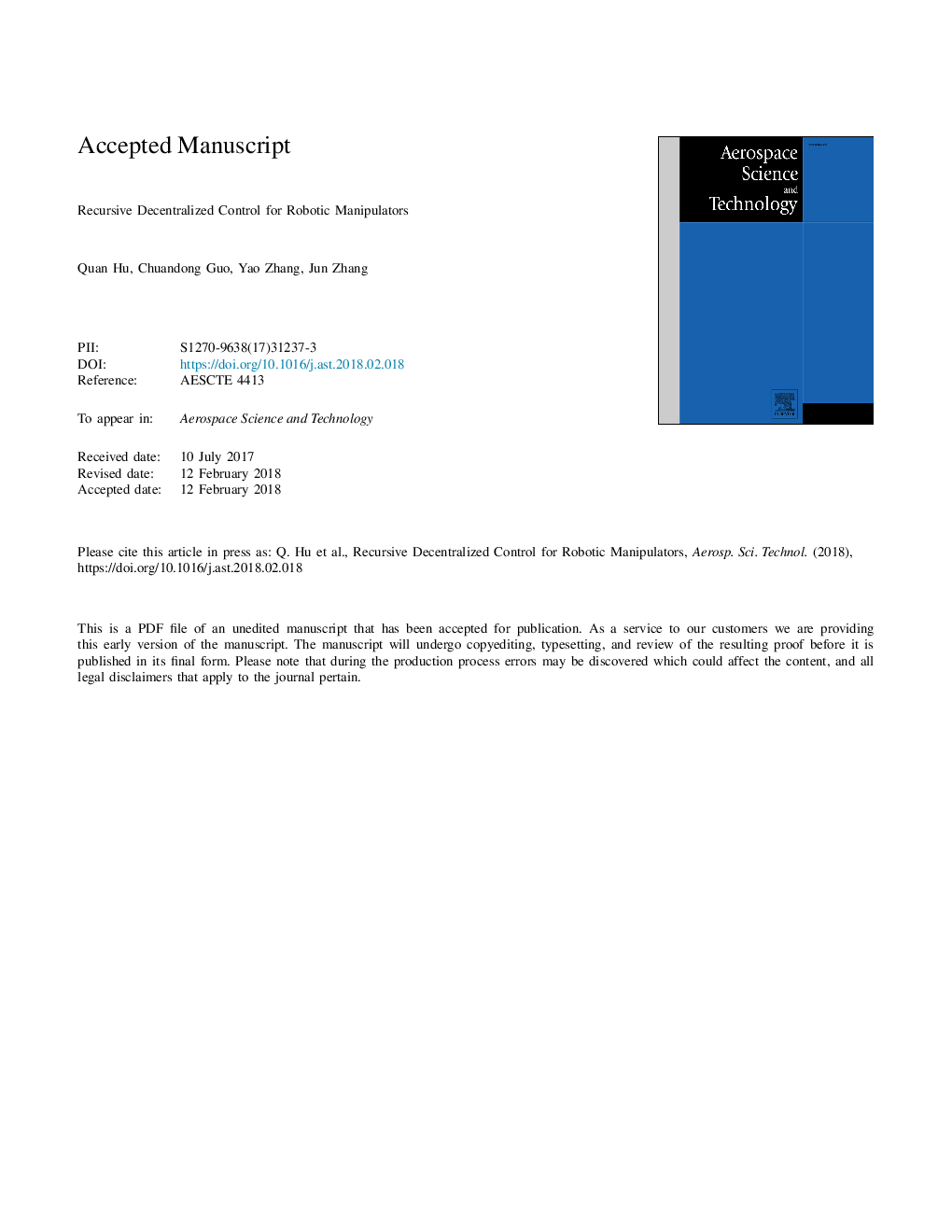| کد مقاله | کد نشریه | سال انتشار | مقاله انگلیسی | نسخه تمام متن |
|---|---|---|---|---|
| 8057910 | 1520058 | 2018 | 27 صفحه PDF | دانلود رایگان |
عنوان انگلیسی مقاله ISI
Recursive decentralized control for robotic manipulators
ترجمه فارسی عنوان
کنترل غیر متمرکز بازگشتی برای کنترل کننده های روباتیک
دانلود مقاله + سفارش ترجمه
دانلود مقاله ISI انگلیسی
رایگان برای ایرانیان
کلمات کلیدی
دینامیک بازگشتی، کنترل انحرافی، کنترل قوی، موانع فضایی،
ترجمه چکیده
در کنترل کننده های متحرک متمرکز جهت ردیابی مسیرهای مکانیزاسیون فضایی، یک مدل پویا متمرکز دقیق مورد نیاز است، بنابراین هزینه های محاسباتی بالا و حافظه های بزرگ برای برنامه های کاربردی مورد نیاز است. در کنترلرهای غیر متمرکز، کنترلگر فضایی به عنوان مجموعه ای از زیر سیستم های مستقل مرتبه دوم مشاهده می شود، در حالی که قانون کنترلی فقط به اندازه گیری های محلی در هر مفصل بستگی دارد. به طور معمول، کنترل غیرمتمرکز بسیار ساده است تا زمان واقعی اجرا شود و محاسبات بسیار محدودی را ایجاد می کند. با این حال، عملکرد کنترل از بین خواهد رفت زیرا تعاملات زیرسیستمها، مانند نیروها و لحظات اتصال پویا، نادیده گرفته می شوند. بنابراین، این مقاله سازش بین کنترل های متمرکز و غیر متمرکز - یک استراتژی غیر متمرکز بازگشتی است. اولا تعاملات در اتصالات دو لینک مجاور به روش صحیح الگوریتم بازگشتی برای پویایی سیستم های چندگانه مدل سازی شده است. سپس، یک کنترل قوی غیر متمرکز بر اساس این فرض است که ارتباطات در کنترلرهای غیر متمرکز اجازه داده می شود. اطلاعات مرتبط شامل حالت های حرکت نسبی در مفاصل، پارامترهای هندسه و جرم و گشتاور کنترل است. این ارتباطات قادرند به صورت بازگشتی بخشی اسمی تعاملات فیزیکی را برای جبران خسارت ایجاد کنند. یک استراتژی قوی تطبیقی بیشتر در کنترل غیر متمرکز برای بهبود عملکرد کنترل طراحی شده است. در نهایت، نمونه های عددی برای یک کنترل کننده فضایی برای تأیید اثربخشی طرح کنترل پیشنهادی انجام می شود.
موضوعات مرتبط
مهندسی و علوم پایه
سایر رشته های مهندسی
مهندسی هوافضا
چکیده انگلیسی
In the standard centralized motion controllers for trajectory tracking of space manipulators, a precise centralized dynamic model is required, thus demanding high computational cost and large memory for applications. In the decentralized controllers, the space manipulator is viewed as a set of independent second-order subsystems, while the control law only depends on local measurements in each joint. Normally, the decentralized control is quite simple to real-time implement and induces a very limited computational burden. However, the control performance would be degenerated since the interactions among the subsystems, such as dynamic coupling forces and moments, are neglected. Therefore, this paper presents a compromise between the centralized and decentralized controls - a recursive decentralized strategy. First, the interactions at the joints connecting two adjacent links are explicitly modeled by the recursive algorithm for multibody systems dynamics. Then, a decentralized robust control is designed under the assumption that communications are allowed in the decentralized controllers. The communicated information includes the relative motion states at the joints, the geometry and mass parameters, and the control torques. These communications enable to recursively construct the nominal part of the physical interactions for compensation. An adaptive robust strategy is further designed in the decentralized control to improve the control performance. Finally, numerical examples are conducted for a space manipulator to verify the effectiveness of the proposed control scheme.
ناشر
Database: Elsevier - ScienceDirect (ساینس دایرکت)
Journal: Aerospace Science and Technology - Volume 76, May 2018, Pages 374-385
Journal: Aerospace Science and Technology - Volume 76, May 2018, Pages 374-385
نویسندگان
Quan Hu, Chuandong Guo, Yao Zhang, Jun Zhang,
